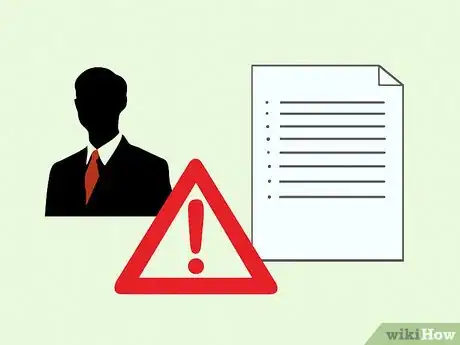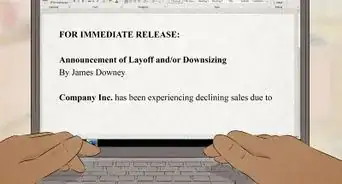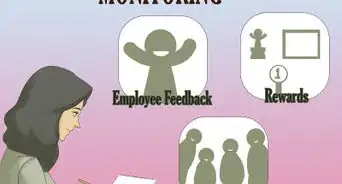This article was co-authored by Chloe Carmichael, PhD. Chloe Carmichael, PhD is a Licensed Clinical Psychologist who runs a private practice in New York City. With over a decade of psychological consulting experience, Dr. Chloe specializes in relationship issues, stress management, self esteem, and career coaching. She has also instructed undergraduate courses at Long Island University and has served as adjunct faculty at the City University of New York. Dr. Chloe completed her PhD in Clinical Psychology at Long Island University in Brooklyn, New York and her clinical training at Lenox Hill Hospital and Kings County Hospital. She is accredited by the American Psychological Association and is the author of “Nervous Energy: Harness the Power of Your Anxiety” and “Dr. Chloe's 10 Commandments of Dating.”
This article has been viewed 21,613 times.
Talking to an employee about their poor performance can be a challenge. You may not want to come across as too harsh, but still be firm and clear about your concerns. However, having employees who do not do their job well or add to your business can end up costing you money and work time. Prepare for the talk by making a list of issues about the employee. Then, have the discussion in a private space and keep the conversation honest so the employee understands your concerns. Follow up after the talk to check in the employee's performance to see if it has improved.
Steps
Gathering Information
-
1Make a list of issues relating to the employee. Be specific when you list the issues and concerns. Write down the most recent issues and then older issues, going back several weeks or months. Include any customer complaints, concerns from other employees, and any other documentation that supports your concerns.[1]
- For example, you may write down, “Employee fails to show up for shifts on time” and then include time cards that illustrate your concern.
-
2Come up with several options or solutions for the employee. Brainstorm a few possible solutions for the employee's poor performance so you can discuss them during your talk with them. This will help you better prepare for the talk and have options ready to wrap up your discussion with the employee.
- For example, you may write down, “Possible solution: employee clocks in on time for a probational period of 1 week” or “Possible option: employee moves to a different department so they do not interact with customers.”
Advertisement -
3Pick a private, quiet space to have the talk with the employee. Arrange a time and place that will ensure you can talk to the employee one on one, in private. This will also allow you to speak honestly and openly to the employee without the entire office or company hearing your conversation.[2]
- For example, maybe you schedule the meeting 30 minutes before the employee's shift in your office. Or perhaps you schedule the meeting with the employee in the afternoon, when they are less busy, in a company conference room.
EXPERT TIP"If you know you need to give challenging feedback, it's helpful to make sure you're not in front of other people."
Chloe Carmichael, PhD is a Licensed Clinical Psychologist who runs a private practice in New York City. With over a decade of psychological consulting experience, Dr. Chloe specializes in relationship issues, stress management, self esteem, and career coaching. She has also instructed undergraduate courses at Long Island University and has served as adjunct faculty at the City University of New York. Dr. Chloe completed her PhD in Clinical Psychology at Long Island University in Brooklyn, New York and her clinical training at Lenox Hill Hospital and Kings County Hospital. She is accredited by the American Psychological Association and is the author of “Nervous Energy: Harness the Power of Your Anxiety” and “Dr. Chloe's 10 Commandments of Dating.”
Chloe Carmichael, PhD
Licensed Clinical Psychologist Chloe Carmichael, PhD
Chloe Carmichael, PhD
Licensed Clinical Psychologist -
4Discuss issues with the employee as soon as you can. Try not to put off talking to your employee about their performance, as this will only make the situation more awkward and difficult. Instead, try to address the issues within several days to a week of them happening.[3]
- If you start to notice a pattern of poor performance in your employee, such as bad customer service for several weeks in a row, speak to them right away so you can find out what is going on.
Having the Talk
-
1Start the talk by expressing your concerns to the employee. Thank them for agreeing to talk to you and use simple, direct language to let them know why you are concerned about their performance. Try to strike an honest but kind tone when you start the conversation.[4]
- For example, you may say, “Thank you for meeting with me. I have some concerns about your performance, mostly due to your tardiness and your treatment of customers.”
EXPERT TIPChloe Carmichael, PhD is a Licensed Clinical Psychologist who runs a private practice in New York City. With over a decade of psychological consulting experience, Dr. Chloe specializes in relationship issues, stress management, self esteem, and career coaching. She has also instructed undergraduate courses at Long Island University and has served as adjunct faculty at the City University of New York. Dr. Chloe completed her PhD in Clinical Psychology at Long Island University in Brooklyn, New York and her clinical training at Lenox Hill Hospital and Kings County Hospital. She is accredited by the American Psychological Association and is the author of “Nervous Energy: Harness the Power of Your Anxiety” and “Dr. Chloe's 10 Commandments of Dating.”Licensed Clinical Psychologist
 Chloe Carmichael, PhD
Chloe Carmichael, PhD
Licensed Clinical PsychologistTry to frame your concerns in a positive light. Licensed clinical psychologist Dr. Chloe Carmichael says: "If you're giving an employee feedback, often it's because you believe that person has the capacity to grow. Start off by saying a few positive things, then let them know there are areas where you'd like to see them improve. Be sure to explain that you see their potential, but there are certain skills that they need to work on."
-
2Provide documentation of your concerns. Show the employee any supporting documentation, such as customer complaints, team feedback, and time sheets. This can help them understand your concerns.[5]
- For example, you may present a copy of a customer complaint to explain your concerns about the employee's treatment of customers. Or you may show the employee their time sheets to support your concerns around their tardiness.
-
3Discuss how their performance affects the business or company. Be clear on how the employee's poor performance has an impact on your other employees, your customers, and your revenue. Explain that it is important for you to have a successful company, and you can only do that with employees who are committed and focused on their job.[6]
- For example, you may say, “As a business owner, I rely on my employees to do their jobs well. When an employee is performing poorly, it affects my business in a negative way.”
-
4Ask the employee questions about their performance and commitment. Use thoughtful questions to get them to open up. Prompt them to talk about why their performance is poor.[7]
- For example, you may ask questions like, “Are you aware that you were late for every one of your shifts last week?” or “Were you aware of the customer's complaint or is their complaint a surprise to you?”
- Use a soft, conversational tone when you ask the employee these questions so you do not come across as hostile.
-
5Maintain eye contact and nod to show you are listening. Keep your body language relaxed, with your body turned towards the employee. Give the employee the time and space to respond to your questions and concerns.
- Try not to interrupt the employee or talk over them. Allow them to respond to your questions and keep the conversation civil so you can both explain where you are coming from.
-
6Discuss ways the employee can address your concerns. Wrap up the discussion by outlining possible solutions for the employee's issues. Provide the employee with several expectations and goals that you need them to fulfill to improve their performance.[8]
- For example, you may say, “I need you to commit to showing up on time for your shifts for the next week. I also want you to work with another employee to improve your customer service. I need to see improvements in your performance to keep you as an employee.”
Following up After the Talk
-
1Schedule a follow up 1-2 weeks after the initial talk. Once you have outlined your expectations, let the employee know when you are going to follow up with them. Let them know that you are giving them a time frame to improve their performance and that you will sit down with them again to check on their progress.[9]
- For example, you may say, “I'm going to follow up with you in one week to check on your progress” or “Let's schedule a follow up meeting for two weeks from now so I can check back with you and see how you have improved.”
-
2Support the employee by offering additional training or schedule adjustments. Make sure you set up the employee for success so they can try to improve their performance and do better. Support them by offering extra training and guidance. Offer to move their schedule around so they will be able to get to work on time. Ask other employees to give them support so they can improve.
- For example, you may move the employee to a different team so they can work in a more supportive environment. Or you may adjust the employee's schedule so they come in during a less busy time, with less customer interaction.
-
3Address any shifts or changes during the follow up talk. Keep tabs on the employee and mark down any shifts or changes you notice about their behavior. Make sure you address these shifts during your follow up meeting with them. Acknowledge any changes to their performance and discuss any improvements you notice.
- If the employee's performance does not improve, you may need to discuss other options during the follow up meeting. You may put them on a probationary period or you may have to let them go, especially if their performance does not get better.
References
- ↑ https://www.tinypulse.com/blog/how-to-talk-to-an-employee-about-their-poor-performance
- ↑ https://www.tinypulse.com/blog/how-to-talk-to-an-employee-about-their-poor-performance
- ↑ https://www.tinypulse.com/blog/how-to-talk-to-an-employee-about-their-poor-performance
- ↑ https://www.shrm.org/hr-today/news/hr-magazine/0416/pages/11-tips-for-talking-about-poor-performance.aspx
- ↑ https://www.shrm.org/hr-today/news/hr-magazine/0416/pages/11-tips-for-talking-about-poor-performance.aspx
- ↑ https://www.hrbartender.com/2013/employee-engagement/how-to-have-a-performance-conversation-with-an-employee/
- ↑ https://www.tinypulse.com/blog/how-to-talk-to-an-employee-about-their-poor-performance
- ↑ https://www.hrbartender.com/2013/employee-engagement/how-to-have-a-performance-conversation-with-an-employee/
- ↑ https://www.hrbartender.com/2013/employee-engagement/how-to-have-a-performance-conversation-with-an-employee/



































































